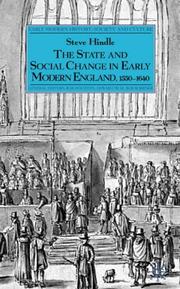| Listing 1 - 10 of 53 | << page >> |
Sort by
|
Book
Abstract | Keywords | Export | Availability | Bookmark
 Loading...
Loading...Choose an application
- Reference Manager
- EndNote
- RefWorks (Direct export to RefWorks)
XVIe-XVIIe s., 1501-1700 --- Séville --- Amérique
Book
ISBN: 9780747512615 0747512612 Year: 1992 Publisher: London: Bloomsbury,
Abstract | Keywords | Export | Availability | Bookmark
 Loading...
Loading...Choose an application
- Reference Manager
- EndNote
- RefWorks (Direct export to RefWorks)
Book
Year: 1970 Publisher: Stuttgart: J. B. Metzler,
Abstract | Keywords | Export | Availability | Bookmark
 Loading...
Loading...Choose an application
- Reference Manager
- EndNote
- RefWorks (Direct export to RefWorks)
Bourgeoisie --- XVIe-XVIIe s., 1501-1700 --- Sociologie religieuse --- Histoire des mentalités
Book
Year: 1997 Publisher: Bruxelles: Archives générales du Royaume,
Abstract | Keywords | Export | Availability | Bookmark
 Loading...
Loading...Choose an application
- Reference Manager
- EndNote
- RefWorks (Direct export to RefWorks)
Censure --- Index --- Histoire du livre --- XVIe-XVIIe s., 1501-1700 --- Pays-Bas espagnols
Book
Year: 1989 Publisher: Bruxelles: Archives générales du Royaume,
Abstract | Keywords | Export | Availability | Bookmark
 Loading...
Loading...Choose an application
- Reference Manager
- EndNote
- RefWorks (Direct export to RefWorks)
Sorcière --- Sorcellerie --- XVIe-XVIIe s., 1501-1700 --- Exposition --- Pays-Bas espagnols --- Bruxelles
Book
ISBN: 0198835620 9780198835622 0191873195 019257258X Year: 2019 Publisher: Oxford: Oxford university press,
Abstract | Keywords | Export | Availability | Bookmark
 Loading...
Loading...Choose an application
- Reference Manager
- EndNote
- RefWorks (Direct export to RefWorks)
Homicide has a history. In early modern England, that history saw two especially notable developments: one, the emergence in the sixteenth century of a formal distinction between murder and manslaughter, made meaningful through a lighter punishment than death for the latter, and two, a significant reduction in the rates of homicides individuals perpetrated on each other. 0'Making Murder Public' explores connections between these two changes. It demonstrates the value in distinguishing between murder and manslaughter, or at least in seeing how that distinction came to matter in a period which also witnessed dramatic drops in the occurrence of homicidal violence. Focused on the 'politics of murder', 'Making Murder Public' examines how homicide became more effectively criminalized between 1480 and 1680, with chapters devoted to coroners' inquests,0appeals and private compensation, duels and private vengeance, and print and public punishment. The English had begun moving away from treating homicide as an offence subject to private settlements or vengeance long before other Europeans, at least from the twelfth century. What happened in the early modern period was, in some ways, a continuation of processes long underway, but intensified and refocused by developments from 1480 to 1680. 0'Making Murder Public' argues that homicide became fully 'public' in these years, with killings seen to violate a 'king's peace' that people increasingly conflated with or subordinated to the 'public peace' or 'public justice'
Homicide --- Homicide. --- Mord. --- History --- England. --- Femicide --- Offenses against the person --- Violent deaths --- XVIe-XVIIe s. -- 1501-1700 --- Angleterre
Book
Year: 1964 Publisher: Cambridge: Cambridge university press,
Abstract | Keywords | Export | Availability | Bookmark
 Loading...
Loading...Choose an application
- Reference Manager
- EndNote
- RefWorks (Direct export to RefWorks)
Théâtre anglais --- XVIe-XVIIe s., 1501-1700 --- Shakespeare, William, 1564-1616 --- Marlowe, Christopher, - 1564-1593 --- Webster, John
Multi
ISSN: 02247658 ISBN: 290392029X 9782903920296 Year: 2000 Volume: 23 Publisher: Ussel: Musée du pays d'Ussel,
Abstract | Keywords | Export | Availability | Bookmark
 Loading...
Loading...Choose an application
- Reference Manager
- EndNote
- RefWorks (Direct export to RefWorks)
Notariat --- --Notaire --- --Histoire rurale --- --Histoire sociale --- --Bas-Limousin --- --XVIe-XVIIe s., --- Notaire --- Histoire rurale --- Histoire sociale --- XVIe-XVIIe s., 1501-1700 --- Bas-Limousin

ISBN: 1403900469 9781403900463 Year: 2002 Publisher: Basingstoke: Palgrave MacMillan,
Abstract | Keywords | Export | Availability | Bookmark
 Loading...
Loading...Choose an application
- Reference Manager
- EndNote
- RefWorks (Direct export to RefWorks)
This is a study of the social and cultural implications of the growth of governance in England in the century after 1550. It is principally concerned with the role played by the middling sort in social and political regulation, especially through the use of the law. It discusses the evolution of public policy in the context of contemporary understandings and of economic change. It also analyses litigation, arbitration, social welfare, criminal justice, moral regulation and parochial administration as manifestations of the increasing role of the state in early modern England
Politique et gouvernement --- XVIe-XVIIe s., 1501-1700 --- Changement social --- Condition sociale --- Grande-Bretagne --- Angleterre --- History of the United Kingdom and Ireland --- anno 1500-1599 --- anno 1600-1699
Book
ISBN: 9780754657231 9781315571034 9781317169222 9781317169239 075465723X Year: 2016 Publisher: London: Routledge,
Abstract | Keywords | Export | Availability | Bookmark
 Loading...
Loading...Choose an application
- Reference Manager
- EndNote
- RefWorks (Direct export to RefWorks)
Counter-Reformation --- Catholic Church --- History --- Great Britain --- England --- Church history --- Christian church history --- anno 1600-1699 --- anno 1500-1599 --- Réforme catholique --- Église catholique --- XVIe-XVIIe s. -- 1501-1700 --- Histoire de l'Église --- Grande-Bretagne --- Angleterre
| Listing 1 - 10 of 53 | << page >> |
Sort by
|

 Search
Search Feedback
Feedback About UniCat
About UniCat  Help
Help News
News